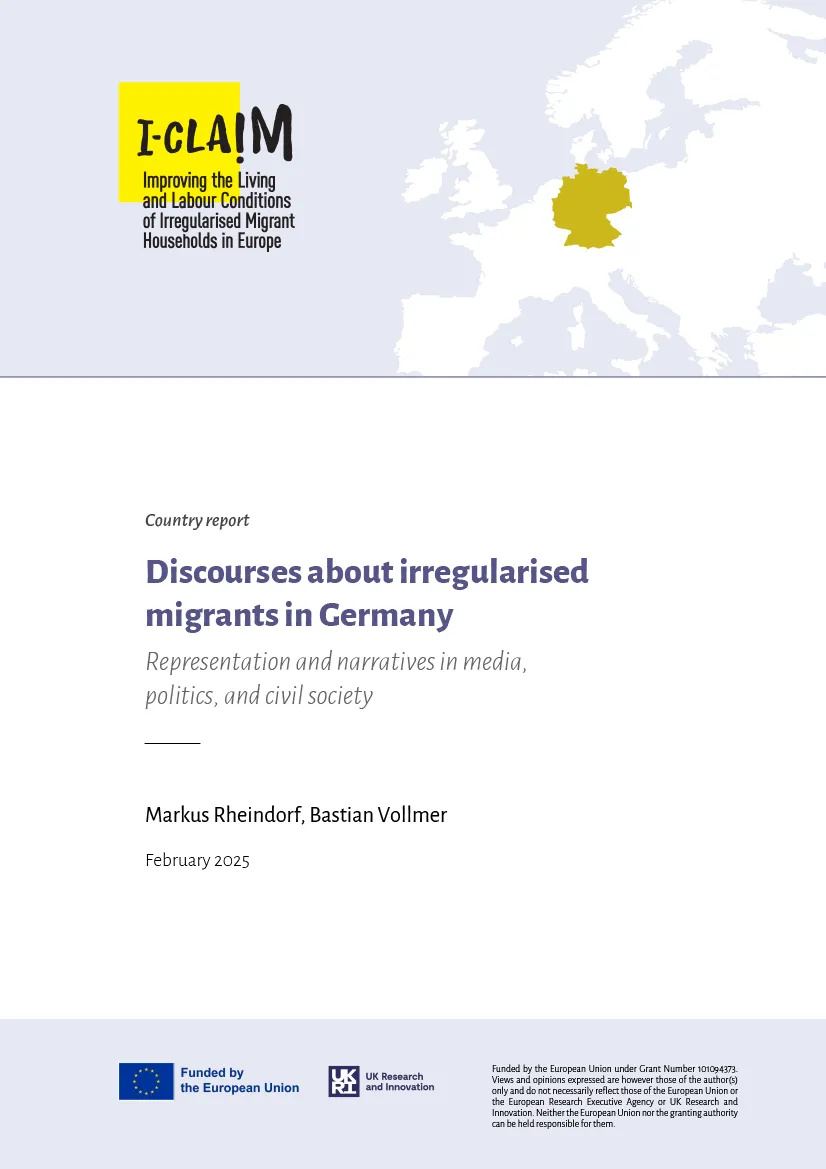Discourses about irregularised migrants in Germany
Markus Rheindorf and Bastian Vollmer
How to cite:
Rheindorf, M.,Vollmer, B. (2025). Discourses about irregularised migrants in Germany. Representation and narratives in media, politics, and civil society. Comparative Report. I-CLAIM.
Discourses about irregularised migrants in Germany
Markus Rheindorf and Bastian Vollmer
Irregular migration remains one of the most debated topics in contemporary Germany, shaping policies, public opinion, and social cohesion. This I-CLAIM report provides a data-driven analysis of how migration is framed in media, politics, and civil society, revealing critical insights into public discourse. By examining the lexical, narrative, and semantic dimensions of migration-related discourse, this report sheds light on how different actors shape public perceptions, influencing policy and societal attitudes toward irregular migrants. The analysis is based on large-scale corpus data and offers a comparative exploration of how these three domains represent irregular migrants and migration.
The analysis reveals significant differences in how each domain frames the issues of migration and irregularity. In the media, irregular migrants are often depicted through actions and experiences, especially in relation to family dynamics, with a focus on terms like “exploitation,” “livelihood,” and “flee.” Political discourse, on the other hand, centres on policy, control, and security, highlighting terms like “border control,” “illegal,” and “government,” and tends to portray migrants in terms of legality, criminality, and economic impact. Civil society narratives emphasize the lived reality of irregular migrants, focusing on family, rights, dignity, and the humanitarian aspects of migration. Terms such as “human rights,” “dignity,” and “vulnerable” are common in this domain, presenting a more empathetic perspective on migrants’ experiences.
The report also compares the semantic groups and collocations of key terms. While media narratives often frame migration through abstract threats and control measures, political discourse reinforces legal and security concerns. In contrast, civil society narratives humanize migrants, centring on dignity, rights, and lived experiences. This stark divergence in framing influences public attitudes and policy responses in particular ways.
Narratively, the domains differ most significantly. The media and political texts predominantly present abstract, impersonalized narratives, often focusing on the general threat or problem posed by migration. Civil society narratives, however, provide more individualized, personal stories, frequently highlighting the agency of migrants and their experiences in everyday settings. These narratives tend to be more empathetic, giving voice to marginalized groups, including women and families, who are less visible in political and media portrayals.
In conclusion, the report highlights a gap in the expertise and accuracy of both media and political discourse regarding irregular migration, where narratives often lack nuance and reinforce biases. Civil society discourse offers a more balanced and humanized perspective, emphasizing the complexities of irregular migration and its intersection with issues such as family, labour, and vulnerability. This report underscores the urgent need for more balanced and informed migration discourse in media and politics. Misrepresentations and biases not only shape public perception but also affect policy decisions with real human consequences. A shift toward more nuanced and empathetic narratives can foster a more constructive public debate on migration and inform policy makers in evidence-based as well as sustainable manners.
